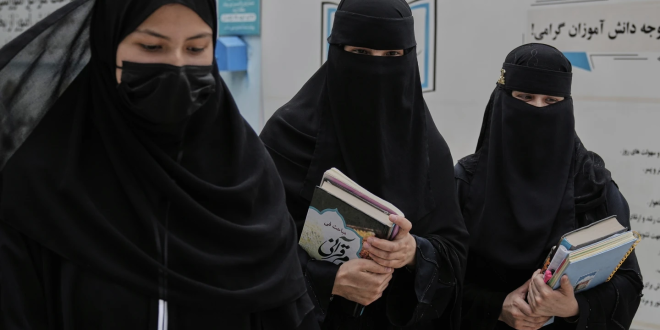KABUL — Nearly three years after the Taliban banned girls from secondary and higher education, Afghan girls are turning to religious schools, or madrassas, as their only remaining path to learning — a shift that critics warn is reshaping education into an ideological tool, suppressing ambition and threatening the nation’s future.
With education for girls halted beyond the sixth grade, millions of Afghan girls are left with few options. In Kabul, 13-year-old Nahideh spends her days working in a cemetery to help her family survive, but she still dreams of becoming a doctor. Knowing that formal schooling is no longer possible, she has resigned herself to enrolling in a madrassa. “If I could go to school, then I could learn and become a doctor. But I can’t,” she said.
She is one of a growing number of girls turning to madrassas in an attempt to stay intellectually engaged. The Taliban have encouraged this shift, with over 3 million students now enrolled in religious schools across the country, according to Taliban officials. These madrassas teach Quranic recitation, Islamic jurisprudence, and Arabic, but offer little to no modern education — no science, no math, no path to university or professional careers.
At the Tasnim Nasrat Islamic Sciences Educational Center in Kabul, about 90% of the students are female, ranging in age from toddlers to women in their 60s. “Since the schools are closed to girls, they see this as an opportunity,” said director Zahid-ur-Rehman Sahibi. He acknowledges that while madrassas provide spiritual education, they fall short of offering the comprehensive curriculum needed for women to participate meaningfully in modern society. “Islam also recommends learning modern sciences,” he said, “but unfortunately, both are not being offered together.”
This pivot to religious-only education is raising alarm among rights groups, educators, and international observers. The Afghanistan Centre for Human Rights has warned that many madrassas have become instruments of Taliban ideological indoctrination, promoting strict gender roles and discouraging critical thinking. Some textbooks reportedly teach that educating girls can lead to “immorality,” while enforcing rigid dress codes and social control.
The consequences of this shift are profound. According to UNICEF, if the education ban continues through 2030, over 4 million girls will be denied education past primary school. The long-term fallout includes a depleted health workforce, widespread poverty, increased child marriage, and a generation of women locked out of the labor force. The World Bank has estimated that the ongoing exclusion of women from education and employment could shrink Afghanistan’s GDP by as much as 2.5% annually.
Girls who once aspired to careers in medicine, engineering, or law now see their futures collapse into narrow roles defined by obedience and domesticity. “They said educating girls is equal to prostitution,” one young woman told researchers, expressing despair at the Taliban’s distortion of Islam to justify their restrictions. Others report rising rates of depression, suicidal thoughts, and forced early marriages, as families try to cope with the economic and social pressures of a country collapsing under authoritarian rule.
Although some madrassas are experimenting with limited modern subjects like English or math, these efforts remain sporadic and unofficial — often shut down as quickly as they appear. And while a handful of Taliban officials, including Deputy Foreign Minister Sher Abbas Stanikzai, have publicly criticized the education ban, dissent is rare and often punished. Stanikzai was placed on indefinite leave earlier this year and is believed to have fled the country.
Taliban authorities claim that Islamic scholars are still “studying” whether girls’ formal education complies with Sharia — a process now dragging into its third year with no resolution in sight. In the meantime, the regime has pressured school administrators and educators to sign pledges refusing to teach girls above grade six, ensuring the policy is enforced across the country.
Despite all this, hope flickers in the shadows. Some girls dream that by mastering Quranic sciences and proving their religious devotion, they may eventually be allowed to study again. “When my family sees that I am learning the Quran and practicing it, they might let me become a doctor,” said Faiza, a 25-year-old student in Kabul. But for now, their future remains bound not by choice or talent, but by decree.
The Taliban’s ban on girls’ education is not just denying a generation of women their dreams — it is robbing Afghanistan of its doctors, engineers, teachers, and leaders. As classrooms turn into prayer halls and textbooks disappear, Afghanistan faces a bleak reckoning: a nation that once nurtured talent across gender lines is now raising daughters to obey, not to lead.
 Afghanistan Times
Afghanistan Times




